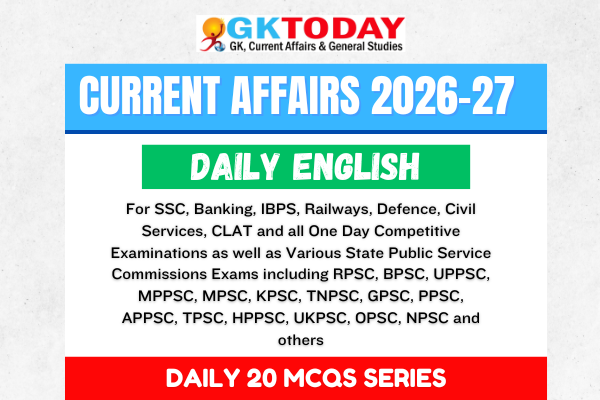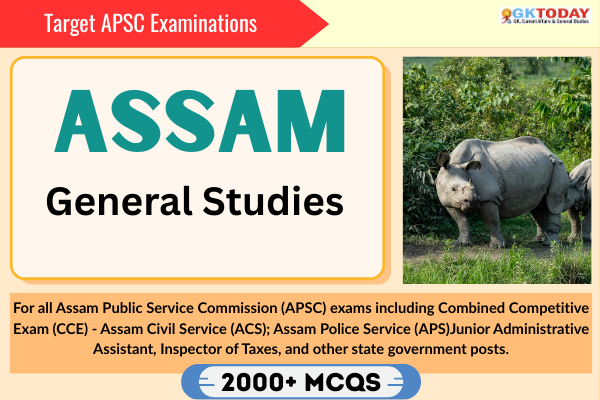11. An affordable model of Personal Protective Equipment (PPE) designed and produced by which Indian Armed Force, has been certified for clinical usage?
[A] Indian Army
[B] Indian Navy
[C] Indian Air Force
[D] Indian Coast Guard
Show Answer
Correct Answer: B [Indian Navy]
Notes:
Recently, the Personal Protective Equipment (PPE) designed and produced by the Indian Navy has been certified for mass production and clinical usage.
The PPE has been developed by the team of Innovation Cell, Institute of Naval Medicine, Mumbai and the Naval Dockyard Mumbai. INMAS (Institute of Nuclear Medicine and Allied Sciences) Delhi, an authorised DRDO organization has tested and certified the PPE. The benchmarks of testing are set by the ICMR and the Health Ministry.
12. ‘Mukhyamantri Yuba Yogayog Yojana’, that was seen in news, is an initiative of which Indian state/UT?
[A] Madhya Pradesh
[B] Uttar Pradesh
[C] Haryana
[D] Tripura
Show Answer
Correct Answer: D [Tripura]
Notes:
‘Mukhyamantri Yuba Yogayog Yojana’ is a welfare scheme of the state of Tripura. It was seen in news as the state’s Chief Minister Biplab Kumar Deb launched an online portal scholarships.gov.in as a part of the scheme.
Under the scheme, the students who are in final year in colleges or Universities can apply through the portal and the state government will provide Rs. 5,000 as a grant for smart phone. More than 14000 students will be benefitted by this scheme.
13. Which day is celebrated by Monaco-headquartered IAAF, in the month of May every year?
[A] World Architecture Day
[B] World Athletics Day
[C] World Tuna Day
[D] World Astrology Day
Show Answer
Correct Answer: B [World Athletics Day]
Notes:
Monaco-headquartered International Association of Athletics Federations leads the celebration of World Athletics Day in the month of May. The first World Athletics Day was celebrated in 1996.
Every year, the date is decided by IAAF and this year it was celebrated on May 7. IAAF was founded at Stockholm, Sweden in the year 1912. The Athletics Day is celebrated to educate the people about the significance of sports and to encourage athletics as the foundational sport in educational institutions.
14. Which global organisation has recognised the advisories released by two institutes of Indian Council of Agricultural Research (ICAR)?
[A] World Economic Forum
[B] World Bank
[C] Food and Agricultural Organisation
[D] World Food Program
Show Answer
Correct Answer: C [Food and Agricultural Organisation]
Notes:
Amidst the Covid-19 outbreak, ICAR-Central Institute of Fisheries Technology (ICAR-CIFT), Kochi prepared advisories for the benefit of the fishing fraternity in 10 different regional languages. ICAR-Central Inland Fisheries Research Institute (ICAR-CIFRI), Barrackpore prepared advisories for the stakeholders involved in freshwater fishing.
The Food and Agricultural Organization (FAO), Rome has recommended these advisories by including them as ‘Voluntary Guidelines for Securing Sustainable Small-Scale Fisheries’ under the Asia-Regional initiatives.
15. Which international organisation has launched a USD 6.7 billion global appeal to fight the COVID-19 pandemic, as a part of its updated response plan to help fragile nations?
[A] World Economic Forum
[B] International Monetary Fund
[C] United Nations
[D] Asian Development Bank
Show Answer
Correct Answer: C [United Nations]
Notes:
The United Nations along with its partner agencies has launched a USD 6.7 billion global appeal to fight the COVID-19 pandemic.
The UN also updated a global plan to fight the COVID-19 in fragile and more vulnerable countries. The plan includes nine more vulnerable countries including the Philippines, Togo and Zimbabwe, beyond the 54 countries covered in the original appeal-the COVID-19 Global Humanitarian Response Plan.
16. As per the recent data released by the Registrar General of India in its SRS bulletin, which state has the worst infant mortality rate in the country?
[A] Bihar
[B] Uttar Pradesh
[C] Madhya Pradesh
[D] Haryana
Show Answer
Correct Answer: C [Madhya Pradesh]
Notes:
According to the data released by the Registrar General of India in its Sample Registration System (SRS) bulletin based on data collected for 2018, the infant mortality rate was found to be 32 per thousand of the population. The national birth rate and death rate stood at 20 and 6.2 respectively.
Madhya Pradesh has worst infant mortality rate in the country with 48 per thousand while Nagaland has the best IMR (4). Bihar continues to top the birth rate list with Andaman and Nicobar Islands at the bottom. Chhattisgarh has the highest death rate, while Delhi has the lowest.
17. As per the new guidelines issued regarding the Aarogya Setu app, what is the maximum number of days the data can be stored?
[A] 120
[B] 150
[C] 180
[D] 200
Show Answer
Correct Answer: C [180]
Notes:
The Government of India has recently issued a set of guidelines to be followed for data processing of Aarogya Setu app users.
As per the new rules, the storage of data beyond 180 days is prohibited and users can seek deletion of their data from the government’s records within 30 days of request. The new norms allow collection of only demographic, contact, self-assessment and location data of infected persons and their contacts. Any violation of these directions may lead to penalties under the Disaster Management Act, 2005.
18. Which Indian sportsperson is set to take charge as the President of the Paralympic Committee of India?
[A] Devendra Jhajharia
[B] Deepa Malik
[C] Mariyappan Thangavelu
[D] Varun Singh Bhati
Show Answer
Correct Answer: B [Deepa Malik]
Notes:
India’s first and only woman Paralympics silver medallist, Deepa Malik is set to take charge as the President of the Paralympic Committee of India.
She had earlier announced her retirement from active sports. She is the only woman para-athlete to have been given the Rajiv Gandhi Khel Ratna award. She is also a recipient of the Padma Shri and Arjuna Award. Deepa Malik won her silver medal at the 2016 Rio de Janeiro Summer Paralympics in shot put. She has won 58 national and 23 international medals.
19. Betty Wright, who recently passed away, was associated with which profession?
[A] Sportsperson
[B] Singer
[C] Politician
[D] Scientist
Show Answer
Correct Answer: B [Singer]
Notes:
Betty Wright, the Grammy winner recently passed away in her hometown Miami, Florida, as per her family sources.
The singer’s real name was Bessie Regina Norris and she was born in 1953. She started her singing career in a musical group called the ‘Echoes of Joy’. The biggest hit of her career was the album named “Clean Up Woman”, which was released when she was eighteen. She won her first Grammy Award for her song, “Where is the Love?”, at the age of 23. She continued her song writing and music production for several years.
20. Indian sportsperson Manmeet Singh Walia, who passed away recently, was associated with which sports?
[A] Tennis
[B] Football
[C] Table Tennis
[D] Hockey
Show Answer
Correct Answer: C [Table Tennis]
Notes:
Former national table tennis champion of India, Manmeet Singh Walia has recently passed away in Canada, at the age of 58.
Manmeet was suffering from ALS (amyotrophic lateral sclerosis) disease that led to voluntary muscle impairment. The veteran player became the national champion in 1989 in Hyderabad. He had represented India at several international events after making his debut at the Asian Championships in 1980.


